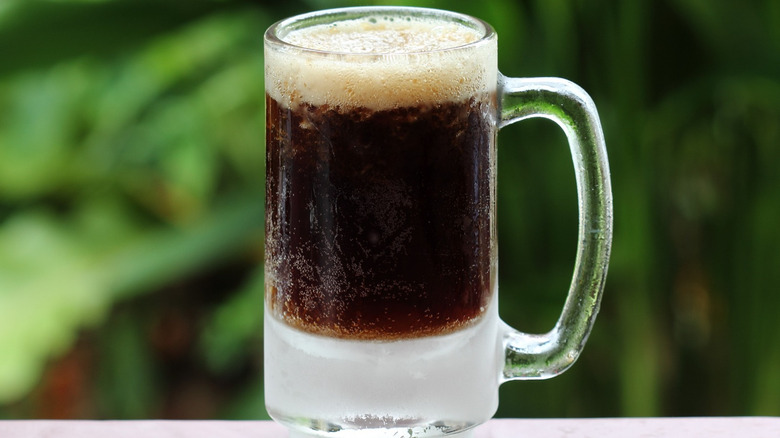Why Some People Think Root Beer Tastes Like Medicine
Soda just isn't as popular as it used to be in the United States. Consumption of the fizzy beverage has been steadily declining since the year 2000, hitting an all-time low of 38.87 gallons per person in 2018, according to Statista. And while this trend appears pretty consistent across the board, some types of soda are faring worse than others. Perhaps unsurprisingly, Coca-Cola still reigns supreme in popularity, while root beer hasn't even reached the list of the top 10 most popular sodas in America, according to Newsweek.
Although its sweet, frothy, and complex flavor makes it a favorite among some die-hard fans, others are turned off by the beverage's unique flavor combination because they think it tastes like medicine. And while everyone has their own flavor preferences, it turns out this isn't just people's taste buds being weird. Traditionally, one of root beer's main ingredients was extract of sassafras, a plant that was commonly used for years as an herbal remedy to help cure a variety of ailments, from bronchitis to skin problems to gout, according to Medicine Net.
Root beer was first sold in pharmacies as a cure-all tonic
The FDA banned sassafras in 1976 due to concerns that it contained a potentially carcinogenic chemical called safrole, per AllRecipes. However, most modern root beer recipes use artificial flavoring to mimic the flavor of the plant extract, so some of that medicinal taste still lingers, according to Eat Delights. But root beer doesn't just contain some of the same ingredients as medicine — it actually used to be medicine! When it was first introduced to the public in the late 1800s, it was marketed as a cure-all drink and sold in pharmacies, according to the Dr. Pepper Museum. In addition to sassafras, traditional root beer recipes also included other common herbal remedies, like wintergreen leaf and licorice root, which were often used to aid in digestion, treat ulcers, and even help alleviate nerve pain. So it's no surprise that people might still associate this mixture with its early medicinal properties.
Even today, many root beer recipes also contain some other pretty unique natural and herbal ingredients, like birch bark, juniper, ginger, burdock root, dandelion root, and wild cherry bark, so it is not exactly shocking that this blend can taste more medicinal than flavorful, according to ThoughtCo. So, if some people are turned off by the flavor of root beer because it makes them think of tonics, tinctures, and cough syrups, well... we can't really say we blame them.

